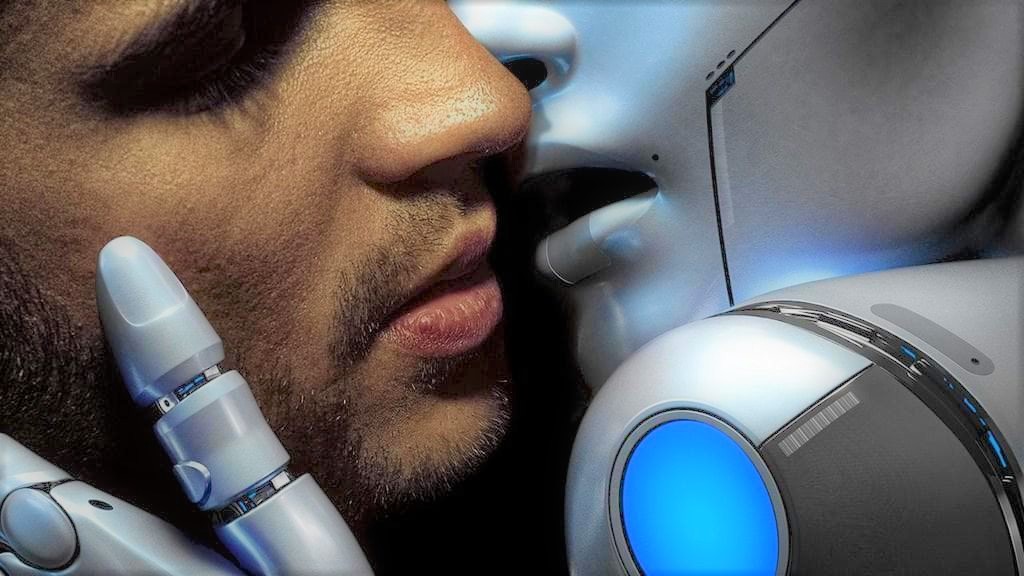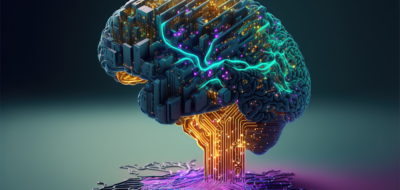Contemporary debates on robotization focus typically on machines that populate workplaces. However, people’s lives are not all work. We need close human contact and emotional interactions with others. All this also concerns the area of eroticism. Are we in for a sexual revolution featuring artificial intelligence? When will learn to make love to me?
The famous movie Ex Machina portrays romance blossoming between a man and an artificially engineered beauty. The incredible humanoid character from Alex Garland’s picture fascinates us because, like us, it expresses emotions, asks questions and engages in conversation. On top of this, it moves gracefully and, importantly, is not devoid of a certain sensuality. The story focuses on the fascinating topic of the future relations between humans and machines. Relations that may grow ever more complicated and encompass an ever broader range of emotions, desires and fears.
What can the ideal lover do?
That a machine can appeal to our sexuality is clear not only to movie-makers. A new industry is emerging right before our eyes associated with entertainment and bodily pleasures. Obviously, the use of a machine, a sex robot or a doll as a sexual gadget is nothing new. However, it has only been in the last few years that the makers of adult inventions have begun to wonder about how to improve sex products using the latest technologies. I realize that the idea of a machine in the role of a lover is controversial and may make many readers cringe. I would nevertheless like to acknowledge some aspects of the idea, deliberately ignoring the matter of the spiritual decay of our species. But, I am not claiming that a vision of a sex robot in our bedrooms offers a particularly attractive way of achieving spiritual and sexual satisfaction. However, I see the field as fraught with issues that strike me as intriguing.
Move like a human
The sex industry faces challenges similar to those which have long occupied the minds of engineers in major research laboratories. Artificial intelligence developers have for years subscribed to the opinion that a true technological breakthrough will be achieved with the arrival of devices capable of mimicking human motion. While algorithms which allow computers to prevail over humans in the games of chess and go have turned out to be achievable, the next big challenge is to build a robot that moves like a human. As it turns out, an insurmountable barrier for contemporary technology is to create a machine whose motor functions are comparable to the movements of a three-year-old. And if the problem remains unsolvable, the thought of creating a perfect sexual partner that replaces a human lover will remain a pipe dream.
The touch of sensitive artificial skin
There are a number of other technical limitations that impede the development of advanced sex gadgets. To be perfect at erotic games, the sex robots of the future would have to combine innovations from multiple fields such as nanotechnology, understanding natural language and engineering.
A key role in experiencing erotic pleasure in humans is played by the skin and the sense of touch. This makes today’s research into synthetic skin intriguing. Engineers from Caltech and ETH Zurich, were able tosuccessfully test synthetic skin capable of sensing a wide range of temperatures. Such skin may be ideal to help people who have suffered limb trauma or even amputations. The temperature sensing mechanism in the machine relies on pectins derived from plant cells. The researchers who discovered the properties of this ingredient created a transparent 20-micrometer-thin film. Film detects temperatures using a mechanism employed by vipers. During their nightly hunts, these snakes can sense the heat of their approaching prey. The new skin can sense temperature changes within the range of 5 to 50 degrees Celsius. Pectin-based systems may have industrial applications, such as for instance temperature sensors or skin used for increased interaction among … robots! In the latter case, artificial skin would trigger a response to the approach of another machine. The mechanism could easily be used for potential sexual interactions between robots and humans.
Sexual paradise
The web abounds with scenarios for sex of the future. Many of them are surprisingly positive. A good example are the predictions of Laura Brendan, who shared her reflections on sex with the readers of The Wall Street Journal. Her article “The Future of Sex: It Gets Better” may be considered to be a manifesto of optimism and joy with respect to the sex of the future. Her conclusions are clearly positive. The author claims that it is only now, with new technologies, that we will be able to experience true sexual joy. We are leaving behind the times when the only way to gain sexual stimulation other than from other humans was to resort to pornographic content. Technological breakthroughs mean that sight is no longer the only sense engaged in providing pleasure in such a context. According to Laura Brendan, advances in the neurobiology of sex will lead to a new ability to stimulate the brain to experience sexual pleasure regardless of physical contact. “Imagine engaging in anything from targeted foreplay to exploring your wildest fantasies by stimulating your partner with a click of the mouse, even when you are across town or in another country”, writes Brendan. For many of us, this vision is neither persuasive nor attractive, due to the psychological barrier it contains which we find difficult to overcome. However, disabled people may have a whole different view of the matter. The sex lives of members of that social group are being increasingly discussed. Much publicity has been given in the media to a debate on a project implemented in Sweden and the Czech Republic, employing sex therapists to help people who are immobile or physically dysfunctional and therefore unable to enjoy sex. It is not a big stretch to imagine that precisely such people are the ones to benefit from the technology-based sexual revolution. I would imagine, for instance, that sex with a close one who cannot visit us physically as he or she is for whatever reason unable to move, may be a joyous experience, even if special software is used for the purpose.
The chilly gaze of a machine
Personally, I believe the limits of the entire sphere lie in communications. While, undeniably, the presence of digital assistants capable of actively responding to our questions (Siri) will be ever more present in our lives, it is nevertheless hard to image virtual software (or a machine) that allows our bodies to detect sexual stimuli and receive the full spectrum of verbal and non-verbal signals that come with closeness. At an intimate moment, as we gaze into our partner’s eyes, we see his/her emotions, devotion, feelings and love. All those things that form an integral part of profound sexual contact. I don’t think we will ever live to see the dilating pupils of the machine we invite into our bedroom.
On the other hand, I agree that such sex would be completely safe. I realize also that for many of us, eroticism is a world of diverse fantasies and needs, which may actually mean that the involvement of artificial intelligence in this field will be both interesting and surprising. There are many big changes ahead of us.
Related articles
– Automation will not destroy all jobs
– Blockchain poised to shake up our lives
– Will quantum computers doom the blockchain?
– Artificial Intelligence for big players only










Guang Go Jin Huan
Basically, our brains are similar to a computer hardwares – contain many complex parts and receive different information, then process them, create emotions and influence you to take some actions.
John Accural
I’m hoping we’ll see a shifting focus less towards accuracy and beating the previous SotA deep learning architecture and more towards other issues like explainability and increasing robustness of existing algorithms against adversarial attacks, as well as more optimization for TPUs and GPUs and better integration of AI tech into the SDLC to make developing, testing, and deploying models easier.
Peter71
Some experts suggest that AI applications cannot, by definition, successfully simulate genuine human empathy and that the use of AI technology in fields such as customer service or psychotherapy was deeply misguided. Few experts are also bothered that AI researchers (and some philosophers) were willing to view the human mind as nothing more than a computer program (a position is now known as computationalism) which imply that AI research devalues human life.
John Macolm
Because society as a whole will only take action against threats they see feasible in ones own lifetime. It’s the same reason that we don’t have more precautions against asteroids. It’s not a feasible threat in this lifetime
AdaZombie
There are already mind-controlled game interfaces, and medical devices to move paralyzed limbs.
Now, to have an “Alexa” in the middle of a mind-controlled communication device is unnecessary and worthless.
Jack666
as far as i´m concerned , first and foremost We need to discover ways in which technology can help facilitate our spirit of enquiry. What is the middle-path in the use of technology and how do we find it? It is a fine line that balances knowing how much to depend on information and when to rely on intuition. It is a skill, to deepen our knowledge with information, yet broaden our vision with the real experience. This skill and balance are essential to avoid the risk of overexposure and fatigue, to keep the creativity flowing and the enthusiasm rising. This is where spirituality becomes a big asset. it seems to me to a certain extent that the technology only must be used as the wellfare of humanity..
Simon GEE
On the bright side, we may rid ourselves from boring repetitive jobs and be able to solve more complex problems with the assistance of AI. I also think AI could model a society without so much focus on keeping social barriers, when we could be a more effective society if we found a way to work together.
The downside is that technology evolves faster than our human institutions (government, culture… ), so we may panic as we tend to do when we face big changes and run amok.
I wish I could live long enough to see some evolution.
John Accural
I think AI is going to take us to World War III, in which opposed nation states do everything to undermine each others social, economic and political infrastructures. Security of systems will be thrown on its head, and human beings will lose the ability to keep up with threats and developments.
Check Batin
Good read
TomaszK1
Creepy
Tom Jonezz
What’s really relevant isn’t the strict mathematical notion of an algorithm, but a broader notion of an algorithm, which is roughly coextensive to whatever it is that computers do. And as it happens, we are delegating more and more morally fraught decisions to computers and their algorithms. In the strict sense of that term ‘algorithm’ there is no algorithm that would allow us to precisely compute the value of a human life in a mechanical, step-by-step, foolproof manner. But that doesn’t stop us from programming a computer to assigned weights to various factors like say age or income or race, health status, performing some calculations, and spitting out a number that tell us whether we ought or ought not give a person a potentially life-saving treatment. Many find the prospect of such a thing truly alarming. It’s hard to blame them for that. After all, how many of us would be willing to trust our own lives to a computer algorithm?
PiotrPawlow
Governance should be involved in technology. Just because some can build it we should follow. Pirates trying to capitalize on gains through technology should be questioned and not be allowed to set the stage for developing technology for humanity. https://www.youtube.com/watch?v=o8_imzEdS84
And99rew
Hope that never
AndrewJo
There’s no way to stop the development, just because it may benefit military; and I believe to set a ‘standard’ is naive thinking – will North Korea, Iran submit to the same standard. Will US and China no try to gain advantage one over another in this ‘standards’?
As with the nuclear powers – the industrial military power will be about a balance between the most powerful nations, and whether the most deadly weapons are deployed – relies on whether that balance is kept.
Check Batin
Maybe just re opens a new company with a different name and do it.
If it’s genuinely true then respect.
Although AI weapons might become eventually better able to avoid civilians than soldiers can, maybe shoot targets to disarm them without killing them too, better than soldiers can.
But the idea of mixing the ingredients of robots, AI and AI weapons into the mix on the planet may eventually bring Skynet into reality!
PiotrPawlow
Machines don’t possess “behavior” Norbert – behavior is a purely human activity and trait — as is “accomplishment”.
You’re article is creepy — time to get out of the dark room and interact with the humans you seem to so insistent to discount and diminish.
John Macolm
Its intelligence is only to solve problems related to their purpose. Don’t believe Hollywood movies where robots feel mistreated and rebel against us for vengeance, it’s just impossible. Software is software. Ones and zeroes. Nothing more, nothing less
Oscar P
A model must often be kept up-to-date with new trends, but it also needs to be analyzed for bias creeping in, in unexpected ways. For instance, there could be subtle biases that may come out in feedback loops as the model retrains itself over multiple iterations.
Zidan78
Not my vision of the future
AdaZombie
AI coded at Tufts University, Massachusetts. By analysing and simulating countless scenarios, the computer was able to solve the mystery of the flatworm’s regeneration in just 42 hours. In the end it produced a comprehensive model of how the flatworm’s genes allow it to regenerate.
Although humans still need to feed the AI with information, the machine in this experiment was able to create a new, abstract theory independently – a huge step towards the development of a conscious computer, and potentially a landmark step in the way we carry out research.
Tom Jonezz
Sometimes an AI is tasked with a very subjective question, like finding the ‘best’ job applicant. Bias is almost unavoidable because the machine has to make some kind of judgment. Someone is always going to look at that judgment as bias.
Norbert Biedrzycki
And99rew
I think you lost the link here Norbert
TomaszKik
Nice
Dzikus99
Computed methods for automated reasoning, learning and perception have become a common phenomenon in our everyday lives. We have our Siri or Cortana to help us out.
The smartphone is an apt and everyday example of how we use AI. We are also hitting the road for long drives and trips with the help of GPS. In utilities, we find that they can predict what we are going to type and correct the spellings. That is machine intelligence at work.
When we take a picture, the AI algorithm identifies and detects the person’s face and tags the individuals when we are posting our photographs on social media sites.
John Macolm
I’d be very surprised if nations don’t have “Manhattan” scale projects in the works and in total secrecy related to the use of neural networks for military planning and prediction, perhaps even target acquisition and firing.
When it emerges on the battlefield as a card up the sleeve which is pulled out when things are looking dire, our current methods of waging war will look as archaic as the weapons of cavemen.
Mac McFisher
If men invent an artificial person which is doing better job then a woman what do you have to do? What do you mean improve yourself??!? You misogynist! What a woman must do is ban it in order to keep her monopoly on that piece of action and billions of men unhappy and miserable because she will not provide what you can get somewhere else and there you have it gentlemen…. i present to you the ‘caring’ more ‘loving’ gender! Aren’t they the best??!?
SimonMcD
When you speak to philosophers, they act as if these systems will have moral agency. At some level a toaster is autonomous. You can task it to toast your bread and walk away. It doesn’t keep asking you, ‘Should I stop? Should I stop?’ That’s the kind of autonomy we’re talking about.
Oscar P
In the case of a large initial data set, the most frequent errors are involuntary: Either the work was not done well, those who created the data sets had biases themselves, or bias emerged in a completely involuntary and unconscious fashion, because of variables and hidden correlations. Data bias is, by far, the biggest problem AI developers face, and it’s at the heart of any number of recent AI debacles, including one company’s botched facial recognition system, which was mysteriously bad at identifying women of color.
TomK
Great article. Thank you
Adam Spikey
Good article. Well articulated, well researched – thanks for sharing it Norbert
Adam Spikey
Well articulated, well researched – thanks for sharing it Norbert
Tom299
Brilliant view. Thank you Norbert
JohnE3
Very nice read Norbert
TommyG
What would happen if everyone started bedding bots? What would be the trajectory? Where would humanity end up if these devices proliferated?
Perhaps we’d be in much the same place as we are now. The invention of sex toys has not stopped people getting married and having babies. Slippery slope arguments are intuitively tempting but they need strong gravity and weak friction.
John Macolm
But if the AI work they are doing is high security, high clearance work then they probably would need to be moved to a secure location to do their work. Letting them do their work in a university lab would make it extremely easy for foreign nations to spy and steal their technology.To my knowledge, nothing like this has happened in the US, Russia or China (as far as I know).
Oscar2
If it kept perverted men and violent men away from real women : awesome, please create as many sex robots as possible and give them away for a very low price ! If it was effective as crime prevention, then it’s amazing and I would even be happy with my taxes funding this. They would satisfy all their urges with a realistic doll in a room away from everyone. That would mean it would “treat” so many potential murderers, domestic abusers, rapists, molesters, stalkers which could now live a happy and peaceful and productive life in society, and most often remain celibate, with an incredible impact worldwide on mental health, and then in many other fields.
Sorry, this comment is just wishful thinking, I wish the real world and psychology worked like this…
Jack666
Right, we already knew we were on the right track, but it feels good to see it mentioned first in almost all these kind of charts!
Check Batin
Google thinking: If our AI is used for weapon use the US will be able to defend itself from the likes of Russia, China, terrorist, etc when they attack. Google talking: Lets ban our AI for weapons use.
Peter71
Currently, many countries are researching battlefield robots, including the United States, China, Russia, and the United Kingdom. Many people concerned about risk from superintelligent AI also want to limit the use of artificial soldiers and drones.
ZoraBora
I think the real issue in the long term with sexbots is going to be the unreasonable expectations of physical attractiveness it’s going to create. They are going to be made to be totally flawless, 100% of the time. They won’t get PMT, or argue with you. This is going to have a serious negative impact on how humans relate with each other. Almost all real people will look ugly in comparison.
I say people, because male ones will be constructed as well. Eventually they won’t just be for sex, they will clean the house and cook as well. People won’t need to partner with each other anymore except for procreation.
John Macolm
For the US, they get a job at Google, etc. The AI projects in these places have deep government ties. I don’t know for Russia and China.
And99rew
he sex robot thing can and probably will become a serious problem, but they still have a long way to go before they cross the line from creepy to realistic (they’ll always be creepy, but they still look too robotic to became super popular at this point IMO). A lot of misogynistic men who probably won’t even buy one like saying things like “what will women do now?? so easily replaceable!” to make us feel bad.
I think men are forgetting that women have one of the most important jobs on the planet: bringing life into the world. Buy all the robots you want, but when you finally decide you want kids a couple decades down the road but no longer know how to talk to a real human woman, what will you do then? Personally, if I find out a guy has ever touched one of those things I won’t be giving him the time of day, and I think this will be true for a lot of us. I’m still waiting for the day a news article is released about a robot getting angry with a guy and attacking him. I’ll find the whole thing hilarious.
The end of the human race is getting closer every day.
TonyHor
It’s time to shred the societal contract with these malthusian tech oligopolies who want to control and brainwash society with climate indoctrination.
Simon GEE
🙂 Love your comment
tom lee
Good read
Norbert Biedrzycki
Top 8 Ethical Concerns for AI
Check Batin
Saying “Google band artificial intelligence” is misleading.
First of all, most people interpret a ban to be a prohibition of something, but Google is not a government agency and therefore can’t “ban” anything outside of their platform.
If they did “ban” something within their platform (Gmail, Adsense, YouTube) the title would be understandable.
But they simply decided to not pursue further development of their AI for use within the US military.
Dzikus99
AI helps us in reducing the errors and the chance of reaching accuracy with a greater degree of precision. It is applied in various studies such as exploration of space.
Intelligent robots are fed with data and are sent to explore space. Since they are more resistant and have a greater ability to endure the space and hostile atmosphere due to their metal bodies. They are built and acclimatized in such a way that they cannot be altered or get damaged or malfunction in a hostile environment.
John Macolm
And I seem to recall a number of articles about a year ago talking about how private companies were scooping up AI experts left and right from academia. The perspective reported at the time was that it was leaving a significant shortage of AI educators at leading institutions, but I could believe that the bigger story could be hidden project.
Guang Go Jin Huan
Given the scale of demand, developers believe that rather than robots being an alternative to human caregivers, the choice may sometimes be between robots and no care at all. But even if that’s the case, the question remains: Can they do the job?